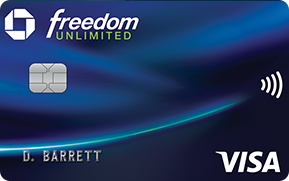- myFICO® Forums
- FICO Scoring and Other Credit Topics
- General Credit Topics
- Why is BK “rewarded”?
- Subscribe to RSS Feed
- Mark Topic as New
- Mark Topic as Read
- Float this Topic for Current User
- Bookmark
- Subscribe
- Mute
- Printer Friendly Page
Why is BK “rewarded”?
Is your credit card giving you the perks you want?
Browse credit cards from a variety of issuers to see if there's a better card for you.
- Mark as New
- Bookmark
- Subscribe
- Mute
- Subscribe to RSS Feed
- Permalink
- Report Inappropriate Content
Why is BK “rewarded”?
First, I don't want to make this seem like I'm disparaging anyone who has declared bankruptcy. We all have to do what we have to do.
It feels like in reading the forums that if you declare BK, you are rewarded for walking away from the debt. People start getting approved with larger CL with prime issuers and scores rebound faster with scores over 700 within a couple of years after BK.
Wheras, if you had a rough time a few years back but stuck with it to pay your obligations, you *MAY* start to rebound SLOWLY after a couple of years as you grind it out continuing to make payments. If you DO get in with a prime issuer, you get a low SL and can't get CLIs to save your life.
Ive read that havin a 90 or 120 day delinquency is considered ALMOST as bad as declaring BK. But, it seems like it is actually worse because even when you do rehabilitate that account and repay the obligation in full, you're still treated like a pariah and nearly impossible to get above 650s across the board (never mind 700s) even 4-5 years out.
it just seems like the current system is set up to reward people who walk away from their debts instead of working through them and paying them off.
06/15/2019:



03/02/2021:



04/06/2021:



05/28/2021:



Lesson Learned: DON'T POKE THE BEAR!!! THE BEAR WILL WIN!!!

- Mark as New
- Bookmark
- Subscribe
- Mute
- Subscribe to RSS Feed
- Permalink
- Report Inappropriate Content
Re: Why is BK “rewarded”?
Interesting subject. Since FICO scores are built on odds, (the odds of you being trustworthy in repaying your debt) maybe the odds are greater that a person who has declared BK will not default.
Edit: maybe a better word would be statistics instead of odds.



EQ FICO 9 - 770
EX FICO 9 - 758
Citi (2) | Discover | HSBC | BOA | NFCU (2) | WF (2) | Simmons Bank | FNBO (2) | PENFED | BBVA | US Bank | Lowes | Care Credit | Home Depot AU
- Mark as New
- Bookmark
- Subscribe
- Mute
- Subscribe to RSS Feed
- Permalink
- Report Inappropriate Content
Re: Why is BK “rewarded”?
Well, that's not entirely true
Chapter 13 involves repayment, while Chapter 7 may involve sale of non exempt assets (if any), and using those funds for repayment.
Your comparison to 90 day late is also wrong. You might have a hard time getting approved at first, but most creditors will not exclude the possibility of approval while late is on CR unlike exclusions due to BK
Based on what I've seen here, BK isn't a walk in the park, but it might speed up rebuild under the right circumstances.
With that said, I'd advise everyone to approach this topic carefully.
All of us have made mistakes, and while it's ingrained in human brain to perceive what others are doing as "worse", there is no place for that on this forum.
Conversion, great.
Judgemental opinions, not so great.
- Mark as New
- Bookmark
- Subscribe
- Mute
- Subscribe to RSS Feed
- Permalink
- Report Inappropriate Content
Re: Why is BK “rewarded”?
I don't know about "rewarded" but I can personally attest that after filing BK in January 2018 I am doing a LOT better. HOWEVER, in no way did I go right back to 700+ scores within 2 years after filing. In fact I have been stuck at mid 600s despite 100% on time payment, DTI under 30%, and 1% utilization AZEO for at least a year. I have 3 cards with terrible limits. Discover (who I did not burn) refuses to go higher than $2600. Cap1 has me bucketed and likely will never budge. I do GET credit but no one is overly generous. What the BK did let me do is rework my financial plan which requires great discipline so that I just bought my first house ever. I am comfortable with my financial picture as I have a nice safety net of liquid cash, enough credit to keep 1% utilization but reap the rewards monthly, and I can handle almost any emergency that might come up financially (not a challenge GOD) should it happen. That alone was worth the pains of BK.
As for the stories about being over 700 in a year or five figure credit lines: I take that with a grain of salt. Remeber this is the internet. That could be ANYONE posting that and all you have is their word. There is ZERO proof of any of it.
- Mark as New
- Bookmark
- Subscribe
- Mute
- Subscribe to RSS Feed
- Permalink
- Report Inappropriate Content
Re: Why is BK “rewarded”?











- Mark as New
- Bookmark
- Subscribe
- Mute
- Subscribe to RSS Feed
- Permalink
- Report Inappropriate Content
Re: Why is BK “rewarded”?
@designated_knitter what "prime" lenders are you referring to? Amex, Chase, Citi, etc won't approve someone with a BK until it has been years after filing.
I am not really sure I would call it "rewarded" but for lenders whose target market is blemished profiles they might feel more comfortable in lending to someone with a BK simply due to there is a time period that another BK can't be filed and discharged therefore some lenders might view that as a lower risk of default (it is not how I would lend money but I am not a bank lol)
- Mark as New
- Bookmark
- Subscribe
- Mute
- Subscribe to RSS Feed
- Permalink
- Report Inappropriate Content
Re: Why is BK “rewarded”?
@Remedios Hopefully, my initial post did not come across as judgemental... if it did, I apologize and would be happy to reword it. I suppose it can sound a bit "It's Not Fair" whiney... and for that I apologize! Again, would be happy to reword it to make it more respectful.
@dragontears I suppose I really don't know... I guess I regard prime lenders to include lending institutiones such as top tier credit unions and other non "too big to fail" banks... Certainly not being stuck with only First Premier and other sub-prime predatory banks, if that makes sense. I realize that Navy is very friendly to folks with blemished records with and without BK. I would consider Discover to be a prime institution.
Perhaps Wells Fargo and BofA are examples of "prime lenders" but don't know if folks with BK have their cards or not. US Bank and PNC also come to mind. Since I have never declared bankruptcy, I guess I don't have good examples off the top of my head.
I was lucky enough to get a disco secured exactly 2 years ago. I felt fortunate when it graduated after 8 months and got a CLI to the usual 2K. However, I have not been able to get another CLI since then despite my scores having increased nearly 100 points, perfect payment record, and keeping balances under control. I have had high overall utilization but am down below the 48 percent aggregate threshold at this point (still relatively high, I know but certainly not maxed out). I also have a lot of new credit since I have been trying to replace the credit limits from when I was shut down by Cap 1 back in 2019.
I would be interested to know whether folks that declared bankruptcy have had better luck with Disco than I have.
I also realize that declaring BK is no walk in the park. It is hard to know what someone is going through on the other side of the screen. However, it does seem like BK is akin to ripping the bandaid off quickly as opposed to the slow painful peel that those who don't declare bankruptcy go through. And those who don't declare bankruptcy often have to let go of assets etc just to stay afloat and keep going. For example, in 2015/2016 when I had my problems, I wound up selling off family heirlooms (jewelry) to keep paying my bills. I wound up taking hardship withdrawals on my 401K as well.
I don't say this as a "woe is me" or what I went through is just as bad... just that folks who are unable (due to means testing) or unwilling to go through BK are also giving up stuff as well -- it just isn't being taken "by force", if that makes sense.
I guess I would also be curious whether the perceived faster rebuilds are after a Ch7 vs Ch13 where you are in a payment plan for several years.
Thanks for the conversation and again, I truly don't mean to pass judgement or cause offense.
Cheers!
06/15/2019:



03/02/2021:



04/06/2021:



05/28/2021:



Lesson Learned: DON'T POKE THE BEAR!!! THE BEAR WILL WIN!!!

- Mark as New
- Bookmark
- Subscribe
- Mute
- Subscribe to RSS Feed
- Permalink
- Report Inappropriate Content
Re: Why is BK “rewarded”?
@designated_knitter, not all bankruptcies are created equal, even if they are the same chapter. Here is a tale of two bankruptcies, one a Chapter 7, the other a Chapter 13:
In the 2009-2013 years, my wife's small business was doing "well" in that it had great support from the community, good press reviews, it was a very inviting place to visit, and had lots of clientele, however, she way over spent on the buildout and ran up far too much debt before the doors opened; as the economy was suffering in those years, instead of her bringing money into the family, we were shelling out $5,000 per month to keep it afloat, hoping the economy turned around soon enough to allow it to at least break even. Didn't happen.
At the same time, my (now former) business launched a novel niche business, and unbeknownst to me, opened up five lines of credit (2 business lines plus 3 credit cards) in my name, and ran up a very significant amount of debt; that business never returned a single penny of income. Needless to say, the stress on our marriage was extreme; we sold off most of our belongings, sold our house at a significant loss, and separated.
In 2014 she filed for Chapter 7, and as part of that process she had to surrender many "priceless" family heirlooms and whatever else the appraisers deemed worth the effort to sell. Her bankruptcy took roughly 5 months from filing to discharge, and that allowed her to start rebuilding her credit with a few sub-prime lenders like Merrick; now 8 years later she does finally have credit scores in the low 700s and has her first "prime" credit card, a MasterCard World Elite with a pretty healthy LOC.
In 2015 I filed for a Chapter 13, and while I didn't need to surrender any of my stuff, I did need to come up with a plan which paid back my lenders at least as much as the value of said stuff. Long story short, I was effectively in "credit prison" for well over 5 years (no credit the year or so before because I was so over extended, and no credit immediately after either), and am just now starting to see scores of 700 happening over the next month or two.
Epilogue, and we are now back together! ![]()
Chapter 13:
- Burned: AMEX, Chase, Citi, Wells Fargo, and South County Bank (now Bank of Southern California)
- Filed: 26-Feb-2015
- MoC: 01-Mar-2015
- 1st Payment (posted): 23-Mar-2015
- Last Payment (posted): 07-Feb-2020
- Discharged: 04-Mar-2020
- Closed: 23-Jun-2020
I categorically refuse to do AZEO!





In the proverbial sock drawer:



- Mark as New
- Bookmark
- Subscribe
- Mute
- Subscribe to RSS Feed
- Permalink
- Report Inappropriate Content
Re: Why is BK “rewarded”?
@Horseshoez Thanks for sharing your stories. Your story certainly seems more akin to what I would expect in terms of rebuilding.... and a comparable timeline that I am experiencing climbing out of my hole.
Im sorry you both had to go through that! However, I applaud you both for getting through it and getting back together so you could preserve your most valuable asset: your marriage!
Would that everyone's relationships could survive!
I hope that doesn't sound trite or like I'm minimizing the financial hardships you both had to endure... just having gone through my own divorce, I am always impressed with couples who can stay together and wish my own had survived...
Thank you again for sharing your story. If you don't mind me asking, is there a reason you didn't go Ch7 vs Ch13? Also, which one do you think was the least painful and easier to deal with and recover from?
06/15/2019:



03/02/2021:



04/06/2021:



05/28/2021:



Lesson Learned: DON'T POKE THE BEAR!!! THE BEAR WILL WIN!!!

- Mark as New
- Bookmark
- Subscribe
- Mute
- Subscribe to RSS Feed
- Permalink
- Report Inappropriate Content
Re: Why is BK “rewarded”?
@designated_knitter wrote:@Horseshoez Thanks for sharing your stories. Your story certainly seems more akin to what I would expect in terms of rebuilding.... and a comparable timeline that I am experiencing climbing out of my hole.
Im sorry you both had to go through that! However, I applaud you both for getting through it and getting back together so you could preserve your most valuable asset: your marriage!
Would that everyone's relationships could survive!
I hope that doesn't sound trite or like I'm minimizing the financial hardships you both had to endure... just having gone through my own divorce, I am always impressed with couples who can stay together and wish my own had survived...
Thank you again for sharing your story. If you don't mind me asking, is there a reason you didn't go Ch7 vs Ch13? Also, which one do you think was the least painful and easier to deal with and recover from?
I had to file Chapter 13 because my income was significantly higher than the median here in New Hampshire, it was also high enough to pay back rather more than my then current assets over a 5-year period. As an aside, every state, and in some cases even within some states, there are different rules about the qualifications for the two chapters, and the rules which need to be followed. In my case, there was literally no option to file for a Chapter 7.
As for which is easier to recover from, there are benefits and drawbacks to both:
- Chapter 7:
- Benefits include, a very short duration between filing and discharge, which allows you to shed assets, and then start over rebuilding in a relatively short span.
- Drawbacks include a 10-year window where the Public Record of the bankruptcy shows up on your credit history, which can make finding a mortgage at a low rate challenging for the entire duration.
- Chapter 13:
- Benefits include having the Public Record drop off your history after 7-years (i.e. 2-years after a 60-month discharge) and being able to protect the equity in a house. Another benefit which I've heard of, but not ever confirmed, is lenders prefer seeing a Chapter 13 on a credit report over either a Chapter 7 or a bunch of defaults, lates, and collections, and as such, are alledgedly more willing to lend.
- Drawbacks include being effectively limited to little or no credit (depending upon where you file) for the term of the Chapter 13 (typically either 3 or 5 years) and a significantly longer time to start rebuilding credit. Depending upon where you live when you file, you can be compelled to hand over some, or even all, of your annual tax returns (here in New Hampshire you need to turn over anything over $1,250).
In my case, I went nearly 7 years without a credit card, and that was very much a challenge from time to time. In one instance I was on a road trip to visit my mother who'd recently had a severe stroke when the alternator of my car died and the only place which had one in stock was a Honda dealer, $700 later I was back on the road. The money I spent was earmarked for my rent which in turn required me to dip into my meager savings to pay the rent. On another occasion I was on a business trip to the west coast, and while there I needed to rent a car to visit a cousin up in Napa for a couple of days. I found out the hard way you cannot rent a car at most (or even all?) major airports with a debit card; I ended up spending nearly half a day on a series of busses to travel only 100 miles.
Long story short, Chapter 7s open your life up to the Trustee to figure out what you own which can be turned over to help pay your creditors. Chapter 13s put you in credit prison, typically for 5 years, where all but a small portion of your DMI is turned over to the Trustee to repay your creditors. Neither is a picnic, that said, the years I spent in my bankruptcy were far better than the alternative of years of collection agencies, judgements, and wage garnishments.
Chapter 13:
- Burned: AMEX, Chase, Citi, Wells Fargo, and South County Bank (now Bank of Southern California)
- Filed: 26-Feb-2015
- MoC: 01-Mar-2015
- 1st Payment (posted): 23-Mar-2015
- Last Payment (posted): 07-Feb-2020
- Discharged: 04-Mar-2020
- Closed: 23-Jun-2020
I categorically refuse to do AZEO!





In the proverbial sock drawer:


